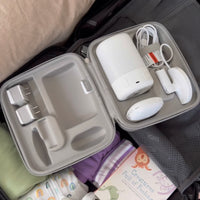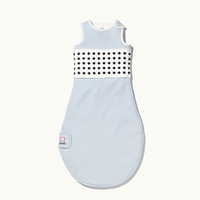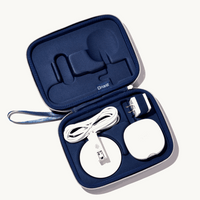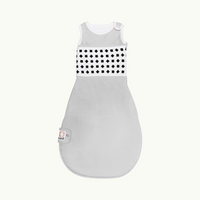10 weeks pregnant — you’re officially in the double digits! Whether you’re feeling excited, exhausted, or somewhere in between (probably all three at once), you’ve reached another important milestone in your pregnancy journey. Right now, your body is doing some pretty incredible work, and your little one is developing at an amazing pace.
Maybe you’re still dealing with morning sickness or planning your first prenatal appointments or wondering about changes in your pregnancy sleep patterns — whatever’s on your mind, understanding what's normal at 10 weeks pregnant can help you feel more prepared and connected to your experience. Let’s break down the essential information you need to take on this new phase with confidence.
Your Baby's Development at 10 Weeks Pregnant
Your baby is about the size of a strawberry right now — so about 1.2 inches and weighing less than a quarter of an ounce. But here’s the thing: this little strawberry is doing some major development right now. This is the week when they officially graduate from embryo to fetus, which means that their most important organ development is almost complete.
Key Developmental Milestones at 10 Weeks Pregnant:
-
Brain development: They’re producing about 250,000 new neurons every minute (no wonder you’re exhausted!)
-
Facial features: Their face is starting to look like, well, a face — with ears, nose, and mouth becoming more defined
-
Limb development: Their arms and legs are growing longer, with tiny fingers and toes clearly visible
-
Bone formation: Cartilage is beginning to transform into bone tissue
-
Organ development: Their heart is now beating at 150-170 beats per minute (nearly twice as fast as yours!)
-
Movement: You might not be able to feel it yet, but they can now bend their elbows and wrists, so stay tuned!
-
Also — their digestive system is forming, and little tooth buds are developing under their gums as they get ready for 2 a.m. feeding sessions!
💡 Nanit Expert Insight “While your baby won't have a recognizable sleep cycle until around 28 weeks, the groundwork is already being laid. By week 10, your baby's brain is growing rapidly, with key areas that will eventually control heartbeat, movement, and basic body rhythms starting to form.” - Maristella Lucchini, PhD., Senior Clinical Researcher at Nanit
Common Pregnancy Symptoms at 10 Weeks Pregnant
If 10 weeks has you feeling rough, you’re not alone — your body is working overtime to support your growing baby. Pregnancy symptoms are typically due to hormonal changes, like increasing levels of human chorionic gonadotropin (hCG), progesterone, and estrogen.
Morning Sickness and Nausea
Morning sickness affects up to 80% of pregnant people, and typically peaks around 10 weeks. As you probably know, despite its name, morning sickness can occur at any time of day. The good news is that these symptoms are likely to improve when your hormone levels stabilize after week 12 of your pregnancy.
Most Common Pregnancy Symptoms at 10 Weeks Pregnant:
-
Morning sickness and nausea (may be at its peak)
-
Fatigue and increased need for rest
-
Breast tenderness and sensitivity
-
Frequent urination
-
Food aversions and heightened sense of smell
-
Mood changes and emotional sensitivity
-
Bloating and digestive changes
-
Mild cramping as your uterus expands
-
Headaches due to hormonal fluctuations
-
Pregnancy sleep disruptions and insomnia
Managing Pregnancy Sleep Challenges at 10 Weeks Pregnant
Although you may feel more tired than usual, the first trimester is often the period when women get the most sleep throughout their pregnancy. This is primarily due to hormone changes during these early weeks. While the quality of this sleep may be disrupted, the total amount of time spent sleeping is often highest during this stage.
Sleep Tips for 10 Weeks Pregnant:
Establish a consistent bedtime routine, keep your bedroom cool and dark, and consider using a pregnancy pillow for comfort. If possible taking naps mid day can ease this sleepiness. When you can, avoid large meals and excessive fluids before bedtime to minimize disrupting your sleep environment.
Prenatal Care and Appointments at 10 Weeks Pregnant
tIf you haven't had your first comprehensive prenatal appointment yet, it's probably happening around now. This visit is typically much longer than future appointments—sometimes 1-2 hours—because your healthcare provider will gather your complete medical history and set up your prenatal care plan.
What to Expect at This Appointment
|
Assessment |
Purpose |
What to Expect |
|
Medical History |
Establish baseline health information |
Discussion of previous pregnancies, medical conditions, medications |
|
Physical Examination |
Assess overall health |
Weight, blood pressure, pelvic exam, breast exam |
|
Blood Tests |
Screen for various conditions |
Complete blood count, blood type, STD screening, immunity tests |
|
Ultrasound |
Confirm pregnancy and dating |
Heartbeat confirmation, accurate due date calculation |
|
Symptom Discussion |
Address concerns and provide guidance |
Review of pregnancy symptoms, lifestyle recommendations |
Emotional and Mental Health at 10 Weeks Pregnant
Being 10 weeks pregnant isn’t just about physical symptoms — there’s a lot happening emotionally too. You might be feeling a mix of excitement, anxiety, and uncertainty. It's completely normal to feel overwhelmed by the reality of pregnancy, especially if you’re also dealing with challenging pregnancy symptoms at the same time.
Common Emotional Experiences:
-
Anxiety about pregnancy health and your baby’s development
-
Mood swings due to hormonal changes
-
Excitement mixed with worry about the future
-
Concerns about managing pregnancy symptoms
-
Anticipation about upcoming prenatal appointments
Nutrition and Lifestyle at 10 Weeks Pregnant
Morning sickness might make eating challenging, but proper nutrition is still super important for you and your developing baby. Focus on nutrient-dense foods when you can tolerate them, and don't worry if your diet isn't perfect — your baby is still very small and doesn't require significant additional calories yet.
Nutritional Checklist for Your First Trimester:
-
Prenatal vitamins with folic acid (400-800 mcg daily)
-
Protein for baby development (75 grams daily)
-
Calcium for bone development (1,000 mg daily)
-
Iron to prevent anemia (27 mg daily)
-
Hydration to support increased blood volume
-
Small, frequent meals to manage morning sickness
Foods to Avoid During Your First Trimester:
-
Raw or undercooked meats, eggs, and seafood
-
High-mercury fish
-
Unpasteurized dairy products
-
Alcohol and excessive caffeine
-
Raw sprouts and unwashed produce
Exercise and Physical Activity at 10 Weeks Pregnant
Staying active can help manage pregnancy symptoms, improve your mood, and promote better sleep. However, your exercise routine may need modifications due to fatigue, morning sickness, and other first trimester symptoms.
Safe Exercise Guidelines for 10 Weeks Pregnant:
Listen to your body and modify intensity as needed. Focus on low-impact activities like walking, swimming, or prenatal yoga. Always consult with your healthcare provider before starting or continuing an exercise program during pregnancy.
When to Contact Your Healthcare Provider
Knowing the difference between regular pregnancy symptoms and when to seek medical attention is important for your health, but can also help give you some peace of mind about how you’re feeling. Reach out to your healthcare provider if you experience any concerning symptoms or have questions about your pregnancy.
Contact Your Provider If You Experience:
-
Severe or persistent abdominal pain
-
Heavy bleeding or bright red spotting
-
Severe morning sickness preventing you from keeping food or fluids down
-
High fever (over 100.4°F/38°C)
-
Severe headaches or vision changes
-
Sudden decrease in pregnancy symptoms
-
Signs of urinary tract infection
-
Concerns about your mental health or sleep issues
What’s Next?
As you progress beyond 10 weeks, it can be helpful to start preparing for the changes and milestones ahead. The remaining weeks of your first trimester will bring continued baby development and hopefully some relief from early pregnancy symptoms like morning sickness.
Weeks 11-12: End of First Trimester
-
Morning sickness may begin to decrease
-
Energy levels often start to improve
-
Prenatal appointments typically move to monthly schedule
-
Possible nuchal translucency screening (11-14 weeks)
-
You may feel ready to share pregnancy news with others
Weeks 13-16: Entering Second Trimester
-
Significant improvement in pregnancy symptoms
-
Increased energy and better pregnancy sleep
-
Baby's sex may be determinable via ultrasound
-
Time to consider prenatal testing options
-
Begin planning for maternity wardrobe needs
Creating Healthy Habits Ahead of Your Second Trimester
10 weeks is a great time to establish healthy habits that will support you throughout your pregnancy and beyond. Focus on nutrition, gentle exercise (as approved by your healthcare provider), stress management, and good sleep hygiene.
💡 Nanit Expert Insight “Good sleep during pregnancy is linked to a lower risk of complications like gestational diabetes, high blood pressure, anxiety, and depression — both during pregnancy and after birth.” - Maristella Lucchini, PhD
Preparing for Your Growing Family
While it might seem early, this is actually a good time to start considering some practical aspects of new parenthood. You don’t have to have everything figured out, but beginning to research and plan can help you feel more prepared.
Where to start:
-
Consider your preferences for childbirth education classes
-
Start thinking about nursery planning and baby gear needs
-
Explore resources for new parent support and education
-
Research pediatrician options in your area
-
Begin learning about newborn care and development
Many parents find it helpful to research baby sleep tracking and monitoring options during pregnancy, so they're prepared to support their newborn's healthy sleep development from day one. Understanding the importance of sleep for both parents and babies can help you make informed decisions about the tools and resources you'll want to have ready.
Creating Your Baby's Environment
You don't need a fully furnished and decorated nursery yet, but it's a great time to start thinking about creating a safe, comfortable environment for your baby. Consider the essentials you'll need and start researching products that will support your baby's development and your peace of mind as a new parent.
Peace of Mind, Delivered in HD
As you prepare for your baby's arrival, consider the Nanit Pro Smart Baby Monitor for tracking your baby's sleep patterns, breathing, and development—giving you peace of mind during those precious early months.
Building Your Baby Registry
Many pregnant people start thinking about their baby registry. If you need some inspo, our comprehensive nursery checklist for newborns can help you understand the essentials you'll need and make informed decisions about products that'll actually be useful.
Focus on quality over quantity, and remember that many items can also be purchased closer to your due date. Prioritize safety essentials, feeding supplies, and items that will help you monitor and care for your baby during those important early months.
Sweet Dreams for the Whole Family
Start thinking about your baby's sleep environment with the Nanit Sound + Light Machine. This smart device helps establish healthy sleep habits from birth with soothing sounds and gentle lighting that can be controlled through your smartphone.
Building Your Support Network
Being 10 weeks pregnant is an ideal time to start building or strengthening your support network. This includes healthcare providers, family, friends, and other expectant parents who can provide guidance, practical help, and emotional support throughout your pregnancy and into parenthood.
The Takeaway
10 weeks pregnant is a big deal, even if you're feeling pretty wiped out right now. Your baby is hitting some incredible developmental milestones—like, they're literally building a brain—and your body is working harder than it ever has to support this amazing process. If you're struggling with morning sickness, can't sleep, or feel like an emotional rollercoaster, that's completely normal. Most of these tough symptoms peak right around now, which means you're probably at the worst of it and things should start getting easier soon.
Remember that every pregnancy is different, so don't stress if your experience doesn't match what you're reading online or what your friends went through. Focus on the basics: eat when you can, rest as much as possible, stay in touch with your healthcare provider, and be patient with yourself. Trust your body, trust the process, and know that you've got this — even on the days when it feels like you definitely don't.













































